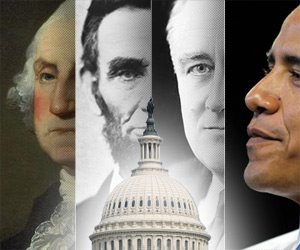 Washington was incredibly passionate about building a network of canals and roads to unite the young republic. Joel Achenbach's wonderful book, The Grand Idea: George Washington's Potomac and the Race to the West, lays this passion out in detail by telling the story of Washington's efforts to build a Potomac canal stretching into the virgin Ohio River Valley. Aside from his pecuniary and speculative motives for the canal, Washington dearly wanted a strong union between the newly independent states, and he believed that this was best accomplished by the free flow of information, people, and goods.
Washington was incredibly passionate about building a network of canals and roads to unite the young republic. Joel Achenbach's wonderful book, The Grand Idea: George Washington's Potomac and the Race to the West, lays this passion out in detail by telling the story of Washington's efforts to build a Potomac canal stretching into the virgin Ohio River Valley. Aside from his pecuniary and speculative motives for the canal, Washington dearly wanted a strong union between the newly independent states, and he believed that this was best accomplished by the free flow of information, people, and goods.So what in the world does this fledging transportation network have to do with energy? It's not like they were using internal combustion engines to get up and down the canal. Although these early efforts at tying the nation together pre-dated gasoline, combustion, and even the steam engine, energy was still required to move barges up and down the canals, or wagons up and down roads. For the most part, that energy was drawn from the backs and legs of draft horses, oxen, porters, servants, and slaves. The chemical reactions that released the energy may have changed over time, but from a physicist's point of view we're essentially talking about the same stuff.
Once we realize this, it becomes obvious why Washington's fervent canal building is perfectly analagous to modern Congressional regulation of CAFE (Corporate Average Fuel Economy) standards, which dictate fuel efficiency requirements to the U.S. auto industry, or tax incentives for renewable energy. Canals not only made river transport more extensive than it had previously been - they also made it more efficient! Likewise, the major difference between cleared roads and woodland trails is that it took a lot more effort (a lot more energy) to move people and goods along a trail than it did to move those same people and goods along a road.
The literature on Washington's disdain for the underdeveloped roads of the South, his admiration for the state of the roads in New England, and his complete fascination with canal engineering is extensive. These sentiments crop up in letters, diary entries, public addresses, and state papers. What I think we've failed to appreciate is that they also represent a dedication to a pro-growth energy policy for the early republic. I have yet to read or hear about Washington's work on the canals from this angle.
One day I'd like to present this perspective in a conference paper or journal article, documenting what the expected energy savings of specific canal and road projects were in the late 1700's. Washington and his contemporaries may not have been able to articulate their policies as "energy policies" at this pre-OPEC, pre-automobile point in history, but that doesn't mean he didn't comprehend the unparalelled importance of securing a ready supply of energy for the new nation... it just so happened that that energy supply was bound up in a relatively frictionless, smooth road, or a powerful canal lock.


No comments:
Post a Comment